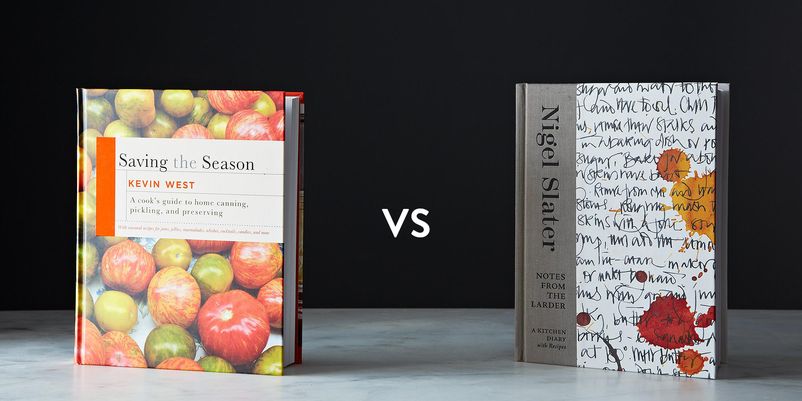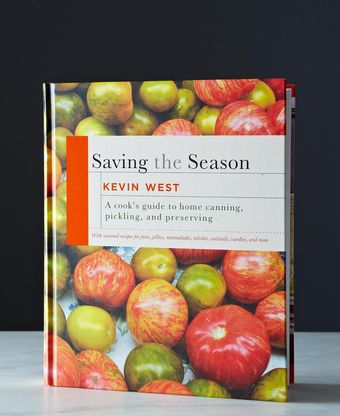These days, if I need a quick hot sauce recipe, I’m not diving through my cookbooks; I’m googling “hot sauce recipe.” But there are still two things they can do that the internet can’t.
First, there’s the aspirational cookbook. Martha Stewart, Simon Hopkinson, and Hugh Fearnley Whittingstall all write cookbooks that make me want to have their lives. I want that kind of perfection, that farmhouse, that kitchen garden, those perfectly retro prawn cocktails. It’s hard to get that kind of deep envy immersion when you’ve got pop-up ads flashing at you.
Nigel Slater specializes in this kind of thing. From his memoir, Toast, to Eating for England, and his vegetable pornucopia, Tender, he’s the kind of guy who sounds like he lives in a remote 400-year-old cottage in the middle of the countryside and is constantly making massive meals in cast iron cookware over the fire for his closest friends who sit around his rough-hewn table for hours, drinking wine, eating his simple and delicious food, and making witty comments.
Notes from the Larder purports to be a book version of the kitchen diaries that Slater has kept for years, jotting down recipes, recipe amendments, inspirations, and thoughts on food as he cooks for himself throughout the year. So February 4 is an essay about the preparation of marmalade, followed by a recipe for Seville Orange Marmalade, then a drool-worthy photo of a smudged and smeared jar of said marmalade; February 7 has thoughts on fish, a recipe for smoked cod and spinach risotto; February 9 is about brown stew and his growing appreciation for pearled spelt. This can either be rapturously seductive, or suffocatingly twee.
This book is not as artless as it appears. This isn’t just his diary reproduced for a few friends, as it claims, but an expensively made, extensively edited, carefully arranged luxury cookbook full of gorgeous photos art directed so delicately that they hardly look art directed at all. This sounds critical, but I fall into the former category (rapturously seduced) rather than the latter (suffocated by twee). This is the kind of book I could take on vacation and read like a novel.
Then I tried some of his recipes. It was hard to resist my natural tendency to tweak a recipe and adjust it to my own style, but I was determined to make a Nigel Slater recipe, not a Dirt Candy dish. I tried his baked pumpkin with fish sauce, his hotpot of eggplant and beans, and a parsley risotto. Every single one of them worked, and they were all solid. The parsley risotto came, like many of his recipes, with a lot of extra frills at the end (Parmesan crisps) that didn’t really add much to the dish, but I’ve been accused of the same thing, so I’m sympathetic.
The risotto and hotpot were straightforward, easy dinners, but the pumpkin was terrific. Universally, across the board, everyone in my kitchen loved it, and the combination of fish sauce and pumpkin were really unique. So out of three recipes, two were fine and one was a stand-out, which is a good ratio. My only criticism is that some of his recipes are measured and detailed, while others are of the “throw-in-a-bunch” variety, and I wish he’d stuck with one or the other to keep it consistent. Also, true to the British stereotype, each of the three recipes I made, including the pumpkin, were overcooked. They were all still good, but Slater seems to like his vegetables towards the “mushy” end of the spectrum.
The second thing that cookbooks have to offer is in-depth information. Plenty of people blog about pickles, or Thai food, or ramen, but finding a structured, deep, technical exploration of a single food is still hard to find online. I’ve made lots of pickles from online recipes, and have occasionally looked up bits and pieces of technical information, but I’ve never had the subject so thoroughly explored as in Kevin West’s Saving the Season, his deep dive into the world of pickling, preserving, and home canning.
West’s book looks far more like a traditional cookbook than Slater’s. Spring starts with a section on jam, followed by four strawberry jam recipes -- each one with a header and a recipe that follows the traditional format -- then a recipe for strawberry preserves, a recipe for rhubarb jam, and a recipe that combines the two into a strawberry-rhubarb jam. Each technique is extensively explained with drawings and photos and there’s a one-page interlude to discuss painter Adriaen Coorte and his painting of “Wild Strawberries in a Wan Li Bowl” from 1704; even so, this looks way more like a cookbook than an immersion in the writer’s life and musings.
Unfortunately, more than Slater, West has an annoying tendency to drop the names of friends and to relate small, pointless anecdotes. Discussing Sunshine Pickles, we get a long paragraph on his friend Frank, a retired GI who lives in Paris. Want an Apricot Cocktail? You’ll also get a story about his friend Stephen who took him to a cocktail bar in Los Angeles where he met Alex. To get to Plum Sauce you have to wade through a description of his mother dating a former classmate named Don. It feels a bit like being at a cocktail party where you keep getting introduced to one uninteresting person after another.
To my surprise, however, I found myself spending more and more time with West’s book. Cutesy stories aside, the breadth and depth of his knowledge about preserving is impressive, and I began to feel like I was understanding some concepts for the first time. The difference between high-acid and low-acid foods, the way he goes into every permutation of tomato as a condiment (sauce, jam, paste, broth, ketchup, barbecue sauce, confit), and his long discourse on forgotten “antique” fruits that taste best in fall (damsons, medlar, pyracantha, and beach plums) was all information presented to me in a handier, more straight-forward way than I’d had before. None of it was brand new, but it was all so simple because it was structured by someone who had a grasp on it. Both authors organize their books by season, but whereas it feels like a whim in Slater’s book, in West’s book it makes total sense. Of course you want to know what vegetables to pickle when.
Slater’s book was a slice of lifestyle that I would love to have, but I’ll never use it again. West’s appendixes on pH balances in foods and peak seasons by region are things I’ll probably refer to in the future. Flip through Slater’s book and there’s a dizzying variety: essays on knives followed by a recipe for rabbit, a piece on whisks, a reflection on his wok, and a recipe for raspberry sugar. Flip through West’s book and there’s a chapter on jams, then jellies, then relishes, then pressure canning, each of them illustrated and explained step by step and with plenty of recipes.
I’m a professional chef, so ultimately I can’t embrace a luxurious cookbook over a useful cookbook. I’ll come back to the useful one sometime this month or next; I’ll immerse myself in the luxurious lifestyle cookbook when I’m retired. Both cookbooks are excellent arguments that there are still some things books do better than the internet, but I’m giving the win to Kevin West’s Saving the Season.



54 Comments
But excellent review - I liked knowing up front the direction the reviewer was coming from